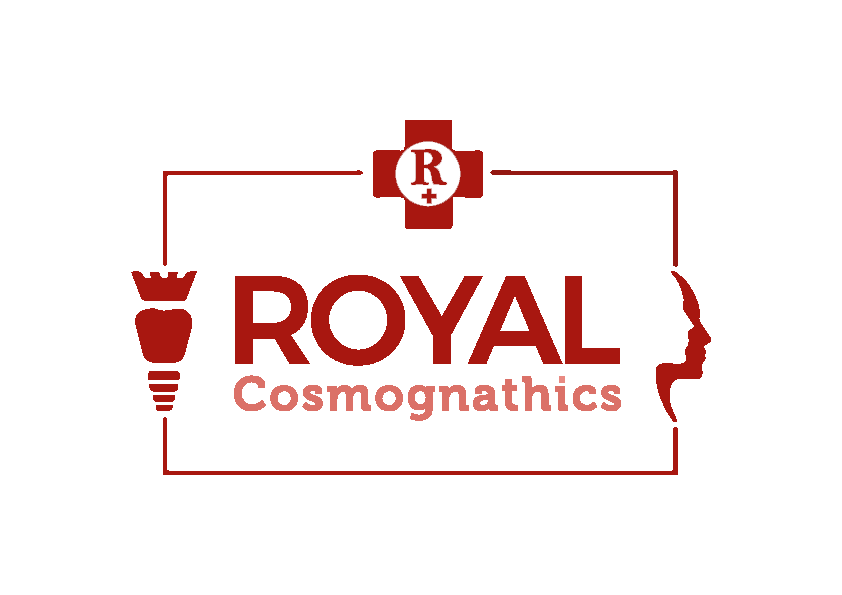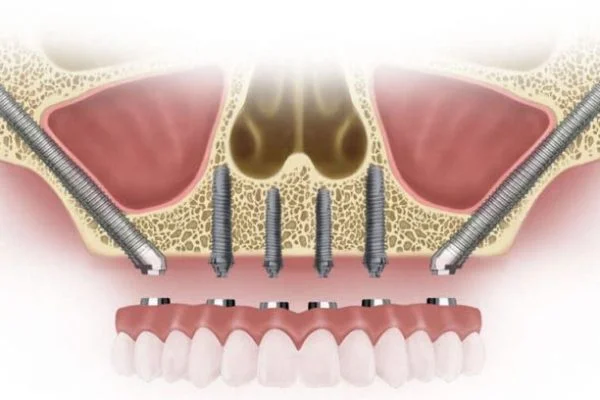
Zygomatic Dental Implants Clinic
Zygomatic implants provide a viable solution for patients who find traditional dental implants unsuitable. At Royal Cosmognathic, our skilled surgeons specialise in addressing cases of extreme bone loss. Dr. Chirag Chamria, an accomplished Oral & Maxillofacial Surgeon at Royal Cosmognathic, stands among a select few surgeons in India with the expertise to perform zygoma implant surgery in patients experiencing bone loss. Our clinic utilises specially designed, in-house zygomatic implants for these procedures.
Zygomatic implants stand out from other implant types, such as All-on-4, by being securely anchored in the zygomatic or cheekbone, hence their name. Typically recommended for patients with insufficient or poor-quality bone in their upper jaw, where traditional dental implants might be impractical. Prolonged use of dentures often results in significant loss of supporting bone, leading to a facial “collapse” or reduction in face height.
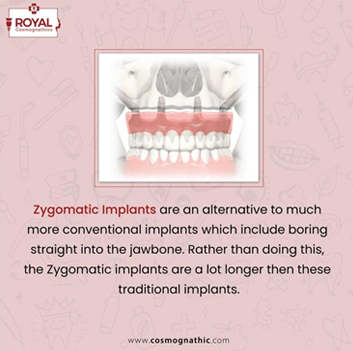
Zygomatic implants effectively address this loss of facial structure, providing a rejuvenating effect on the overall appearance. Additionally, for patients requiring Jaw Alignment Surgery, the strategic placement of zygomatic implants can complement the corrective measures, contributing to both functional and aesthetic improvements
Zygomatic Dental Implants at Royal Cosmognathic
At Royal Cosmognathic, the zygomatic implant stands out as the preferred choice for addressing severely resorbed maxilla cases. In the absence of this implant, many patients would be compelled to undergo invasive grafting procedures to establish sufficient bone volume for conventional implant placement. Zygomatic implants not only eliminate the need for grafting but also expedite the treatment process, resulting in notable post-operative enhancements in both function and aesthetics.
We, at Royal Cosmognathic, favour the use of Zygomatic implants based on our observation that, in numerous cases, this treatment leads to a dramatic improvement in the patient’s quality of life. Prior to undergoing zygomatic treatment, these patients often face oral handicaps that contribute to various psychological, social, and functional challenges. Dr. Chirag Chamria emphasises, “In my experience, post-treatment, the quality of life can return to normal. It’s truly remarkable.
We at Royal Dental Clinics prefer Zygomatic implant as we have noticed in several cases that after zygomatic treatment the improvement in quality of life for the patient is dramatic. Before the treatment, these patients are orally handicapped, which can lead to a lot of psychological, social and functional problems. Dr. Chirag Chamria mentions that, “In my experience, after the treatment quality of life can return to normal. It’s remarkable”.
How do Zygomatic Dental Implants work?
They are attached to the area of the jawbone close to the zygoma bone. The longer implant is placed from inside the mouth and it goes through or right next to the sinus and anchors into the zygomatic bone. We can now immediately load zygomatic implants with fixed teeth.

Can you have Dental Implant in severe bone loss?
Bone resorption along with lower bone quality often makes it impossible to place dental implants in the posterior maxilla. Zygoma implants are then advised to such patients wherein the implant is anchored into the zygomatic bone rather than the maxilla.
Benefits of Zygomatic Dental Implants?
Zygomatic implants offer a practical solution for replacing missing teeth, especially in cases with minimal or no available bone. In contrast to traditional dental implants, zygomatic implants securely anchor into the cheekbone, providing enhanced stability. This makes them particularly suitable for situations involving significant bone loss or resorption. Not only are zygomatic implants less invasive compared to bone grafting and sinus lift procedures, but they also involve a one-stage process, leading to quicker healing times. These implants serve as an effective alternative for patients who may not be suitable candidates for traditional implants.
Dental Care for Adults: Zygomatic Implants | Royal Cosmognathic
As individuals age, tooth loss becomes a common concern, with an estimated 92% of adults in India between 20-64 years experiencing tooth decay. The prevalence of missing teeth rises significantly in those above 45 years, attributed to factors like tooth decay, gum disease, poor oral hygiene, and injury.
Innovative Solutions at Royal Cosmognathic: Zygomatic Implants
Royal Dental Clinics in Kandivali, Mumbai, proudly lead in zygomatic implant placements, employing modern virtual surgical planning and surgical guides. The use of SAPTeeth™ enables the restoration of the upper jaw with immediate load protocols, providing permanent fixed shock-absorbable teeth.
Zygomatic Dental Implants Explained:
- Ideal for cases of insufficient bone in the upper jaw.
- Distinguished by their longer length and diagonal placement into the cheekbone (Zygoma).
- Utilises extra bone in the cheek, known for minimal resorption.
Success Rate for less bone Implant:
- Over 5 years: Approximately 96% success rate.
- Over 10 years: Maintains a commendable success rate of around 93%.
Zygomatic Implants with Pinhole Technique in One day
The Zygomatic Implants are used for full mouth dental rehabilitation for severely resorbed bone. The traditional technique for implant placement was in the bone, but in cases with less or no bone, a Zygoma Implant was recommended. Although, there is improvement in the quality of life of the patients, yet the invasive surgery involved needs to be performed with utmost care. Zygomatic Dental Implants anchored into the cheekbone, also known as Zygoma or Zygomatic Bone. These implants are used in cases where the patient has a missing jawbone or the jawbone is soft and thin. Most patients above 45+ years end up losing a few or all of their teeth.
Pre-Clinical Zygomatic Implant Steps
Case Paper Submission:
- Provide essential details (Name, Age, Gender, Address, Occupation) on the case paper.
- Hand it over to the receptionist.
Initial Inquiry and Case History:
- Respond to questions from the attending dental surgeon.
- Reiterate any allergies for accurate record-keeping.
Thorough Examination:
- Undergo a comprehensive examination.
- Capture all necessary details for treatment planning.
CBCT Scan (if required):
- Conduct a CBCT scan in most cases before the final consultation.
Treatment Options Discussion:
- Receive an explanation of treatment options, including pros and cons.
- Feel free to ask relevant questions.
Few more pre-clinical steps for Zygomatic Dental Implants
Acceptance and Consultancy Charges:
- Confirm acceptance by signing the case paper.
- Pay consultancy charges of INR 1500 or 25 US$.
Jaw Impressions:
- Take impressions of both jaws.
- Proceed with discussed and agreed-upon plans upon request.
Digital Design Process:
- Initiate model preparation, followed by a 30-minute digital teeth design.
- Scan the model and feed it into the CAD machine.
CAM Machine Processing:
- Within 30-60 minutes, your design is ready for machining.
- CAM machines prepare final teeth in about 10-15 minutes per tooth.
- Simultaneously prepare upper and lower jaw teeth, reducing net time by 50%.
Comfortable Waiting:
- During teeth preparation, relax in the waiting room with a relative and refreshments.
Anaesthesia and Pre-Surgery Steps:
- Anaesthetize the operation area for numbness during surgery.
- For zygomatic implant cases, take necessary precautionary steps based on bone loss severity.
Final Restoration:
- In most cases, fix the final restoration on the same or the next day.
- Some cases may have scheduled fixation for another day.
Successful Recovery after Zygoma Implant Surgery
“Zygomatic Implants are suitable even for patients who are advised that conventional implant treatment will not be possible due to less bone or no bone maxilla bone.”
Dr Chirag Chamria
- Rest – You’ll want to focus on resting as much as possible during the healing process. This is the best way to minimise the risk of complications and get back.
- Stay hydrated – Make sure you drink plenty of water to stay hydrated while you heal.
- Eat a nutritious diet – Eating a nutritious diet will help you recover quickly.
- Get plenty of rest – This will also help you to avoid infection and speed the healing process.
- Avoid smoking, drinking alcohol, and caffeinated beverages – Smoking and drinking alcohol will delay your recovery, and caffeine is diuretic and will dehydrate you.
The major reason for getting a zygomatic implant is when there is loss of teeth and accompanied by loss of bone. To restore the function of the upper jaw and teeth zygomatic implants may be an option.
- Find gentle physical activity – Regular gentle exercise can speed your recovery, but avoid strenuous activity to minimize the risk of bleeding.
- Keep the wound clean – Keep the wound site clean and covered with a bandage as instructed.
- Avoid stress– Stress can slow the healing process, so try to keep it at a minimum while you recover. Keep eye out for any signs of infection, swelling at wound site, and your surgeon if you have concerns.
- Avoid sun exposure – You’ll likely be taking antibiotics to reduce the risk of infection while healing. This means extra care to avoid sun exposure to avoid blistering and peeling.
Why get Zygomatic Dental Implants?
If you lost your bone and tissue due to accident, infection, you may need to get facial implants. These may be recommended if you’ve had a lot of facial trauma, have cancer, or have had a stroke. If the tissue around your mouth has decreased, dental implants may not be help you eat and smile normally.
How much does it cost to get Zygomatic Dental Implants?
The cost of zygomatic implants is typically between $1500 to $2500. Remember that the procedure takes only one visit to complete and will last for many years to come. Dental implants last for the rest of your life, but there are a few reasons replaced. Implants may removed if you have an infection or if they’re not functioning properly. The cost of dental implants is typically around $2,000-$5,000 per implant and includes the cost of surgery.
Zygomatic implants are another option that in place of missing teeth or to improve the appearance of your smile. Zygomatic implants made entirely from titanium and anchored on the bone rather implanted into it like dental implants. This makes them preferable for those who don’t want their look altered with a titanium screw, as well as those who have lost many teeth and require multiple implants at once.
Insurance coverage for Zygomatic Dental Implants
The availability of dental insurance coverage for zygomatic implants varies from one plan to another. Some plans offer full coverage, while others have no coverage for this procedure. In India, most of the medical insurance, do not cover the process of zygomatic implants. But in case if you have lost the bone and teeth due to tumor or cancers then the rehabilitation may also be covered.
Risks of Zygomatic Dental Implants
Zygomatic implants are relatively new, and their long-term effects ongoing researched. As of the time of writing, there are no conclusive studies proving the effectiveness of the implants in long-term use. Although there are no risks using these dental implants, there may be some short-term risks. One of the most common risks of these dental implants is infection. If the implant is not placed properly or if the bone around the implant is too weak, the implant could become infected. This can spread beyond the implant and cause serious damage to surrounding bone. If you are considering these implants, it is important to get a professional opinion before implantation.
Graft-less Solution for Permanent Teeth
Traditionally, periodontists dealing with patients who had low bone density in the jaw had only a few options. The surgeon could take a piece of denser bone from another place in the patient’s body and graft it to what remained of the jaw. Alternatively, the surgeon could take a synthetic bone graft and attach it to the jaw. These procedures involved multiple steps and took more time than graftless procedures. They were also highly expensive. In a graftless procedure, our surgeon at Royal Dental Clinics simply attaches the Implant to the cheekbone. There is a CT scan which is done in our in-house machines beforehand, the entire implant can be done in the matter of a few hours at Royal Dental Clinics. Patients have opted for graftless procedures as its a long term solution.
FAQS ON ZYGOMATIC IMPLANTS
IMPLANTS ARE FOREIGN MATERIALS IN THE BODY, DO THEY CAUSE ANY HARM?
Firstly, they are QC and fit for human implantation. Dental implants have not shown any allergic reaction. This material is similar to the materials used by orthopaedic surgeons for fracture treatment, knee replacements etc.
I HAVE HEARD, IMPLANTS IN THIN/WEAK BONE ARE NOT STABLE IN LONG TERM, WHAT IS DIFFERENT IN THIS TECHNOLOGY?
Zygomatic dental implants by itself has a success rate higher than the conventional dental implants Internationally. SAPTeeth with zygomatic dental implants offer added advantage of reduced pressure on the jaw bone. Hence, this technology offers long term stability.
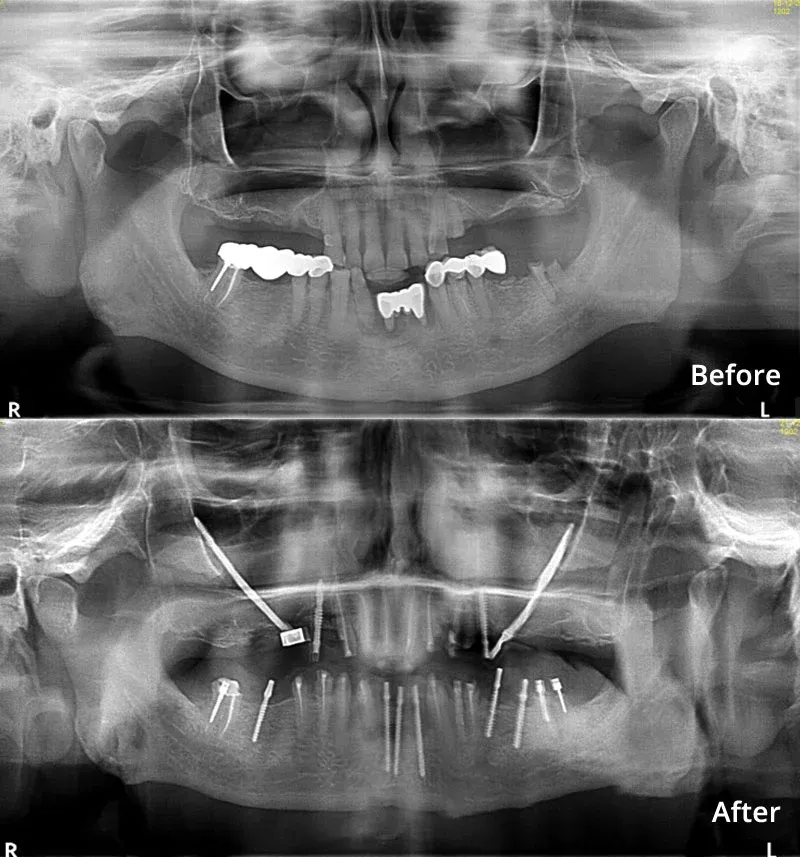
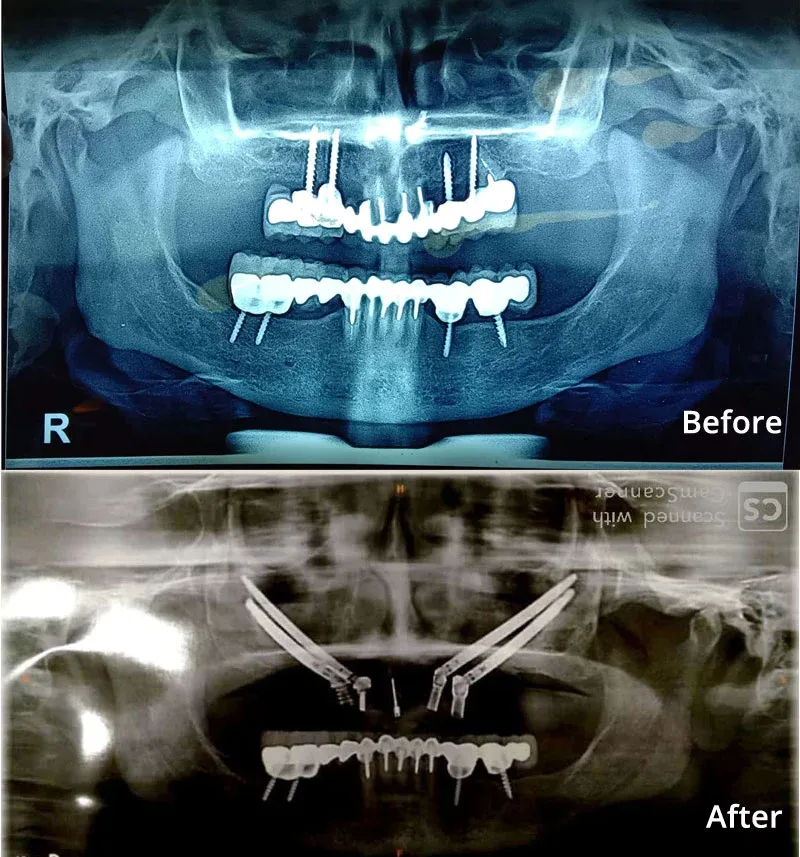
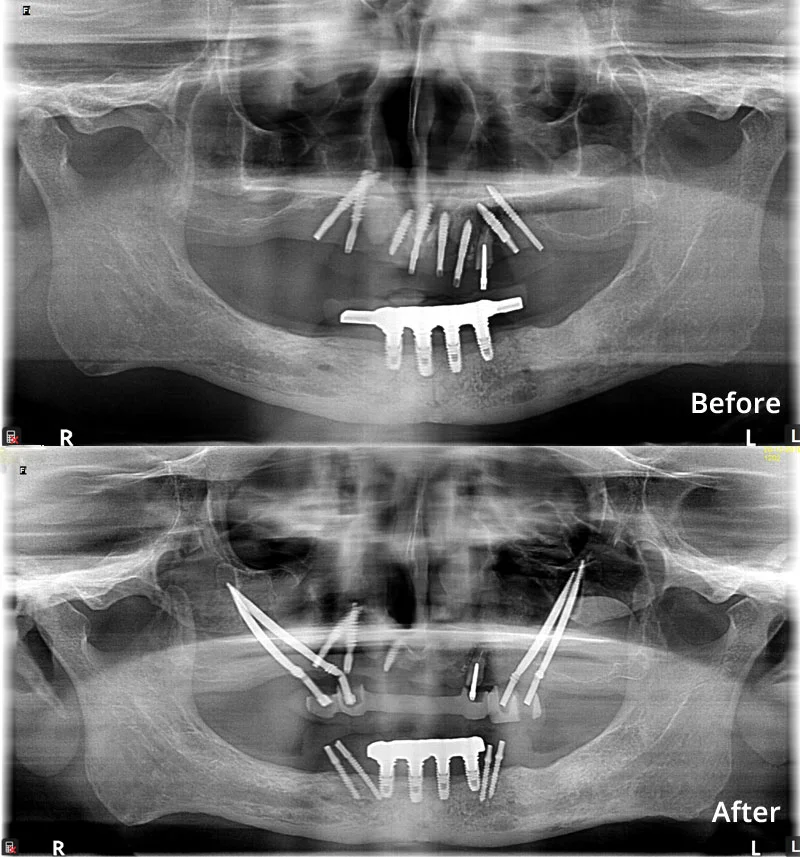
WILL MY SMILE AND LOOKS CHANGE?
A good smile is the one in which the edges of the upper teeth seat just above the lower lip. In other words, your looks will not change, but it will be enhanced youthfully.
HOW LONG WILL THE NEW TEETH LAST?
The success rate of dental implant is 95% over a 5 year period and 90% success rate over a 10 year period. However, Royal Dental Clinics offers a 5 year service free warranty for the treatment performed.
Frequently Asked Questions
What are the benefits of choosing zygomatic Dental implants ?
Zygomatic implants present a range of advantages, notably eliminating the necessity for bone grafting in instances of significant upper jaw bone loss. By anchoring into the cheekbone, also known as the zygoma or zygomatic bone, these implants offer a stable foundation for dental restorations, even in challenging anatomical conditions. Particularly beneficial for individuals with compromised bone structure, zygomatic implants provide a swift and efficient solution for tooth replacement, addressing cases where the patient has a missing jawbone or when the jawbone is soft and thin. This innovative approach is especially relevant for patients aged 45 and above who may experience tooth loss.
What is the recovery process like after zygomatic implant surgery?
Following zygomatic implant surgery, patients may encounter swelling and mild discomfort, necessitating adherence to a soft diet. Subsequent to the procedure, regular follow-up appointments will be scheduled to oversee the healing process, which can span several months before the placement of dental restorations. The overall success of dental implants is intricately tied to one’s general health, and maintaining optimal oral hygiene is paramount to prevent implant failure. Diligent flossing and brushing around the implants, at least twice daily and without the use of metal objects, are crucial practices. Your dentist will furnish specific instructions on the care of your newly implanted teeth. Additionally, periodic cleanings, potentially up to four times annually, may be recommended to ensure the preservation of healthy gums.
How is orthognathic surgery planned, and what are the steps involved in the procedure?
Orthognathic surgery is intricately orchestrated through the utilization of sophisticated imaging technologies such as X-rays, CBCT scans, and 3D digital models. This meticulous procedure entails precise incisions in the jawbone, strategic repositioning of jaw segments, and subsequent stabilization using screws or plates. Following the surgery, a healing period ensues, followed by postsurgical orthodontic treatment, all aimed at attaining optimal jaw alignment and function.
How long does it take to see the final results after orthognathic surgery?
The ultimate outcomes of orthognathic surgery may become more evident once the initial swelling diminishes, a process that typically unfolds over a few weeks to a few months. However, achieving comprehensive healing and stable jaw alignment may span several months to a year before the complete and visible fruition of the results.
Who requires zygomatic implant?
In situations where there is a scarcity of bone or the existing bone is weak, dental implants can be a viable option, with or without the need for bone grafting. Additionally, the All-on-4 Technique offers the possibility of securing all teeth in a jaw using just four implants.
How much do zygomatic implants cost?
Opting for zygomatic implants may not only prove to be a more economical choice but also require less effort compared to the process of bone grafting. In India, the cost is approximately one-tenth of that in the USA.
How Do Zygomatic Implants Work?
Zygomatic implants are affixed to the region of the jawbone near the zygoma bone. The extended implant is inserted from within the mouth, traversing or closely aligning with the sinus, and securely fastening into the zygomatic bone. Notably, immediate loading of zygomatic implants with fixed teeth is now a viable option.
Are Zygomatic Implant successful?
The efficacy and comfort level of zygomatic implants often surpass those of conventional removable alternatives. Additionally, in instances of significant bone loss, zygomatic options may represent the sole means to restore a confident smile with fixed teeth.
Recovering from Zygomatic implant surgery?
The precise recovery duration following zygoma implant surgery varies based on individual cases and the specific surgical approach employed. Generally, the full recovery period typically ranges between two to six weeks.
Insurance coverage for zygomatic dental implants
The inclusion of zygomatic implants in dental insurance coverage varies among different plans. While some plans provide comprehensive coverage, others may exclude this procedure entirely. In India, the majority of medical insurance plans typically do not cover zygomatic implants. However, if the loss of bone and teeth is attributed to tumors or cancers, there might be a possibility of coverage for the rehabilitation process.
